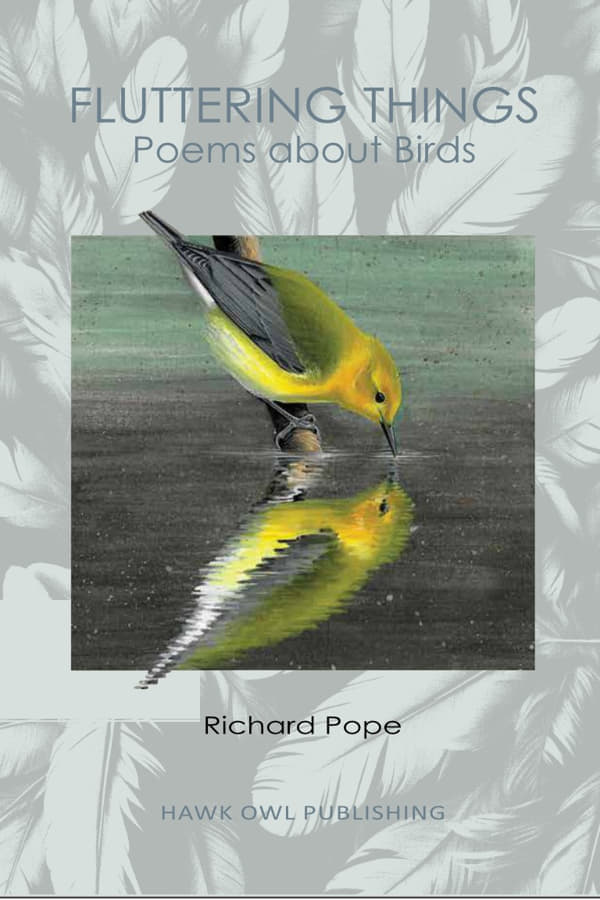These poems are excerpted from Richard Pope’s recent collection, Fluttering Things: Poems about Birds. The book is beautifully illustrated with watercolors and photographs.
All proceeds go to Thicksons Woods Land Trust and Matt Holder Environmental Research Fund.

Chickadees
In feather-white silence
I hear them
discussing me
soft reedy whistles and thin nasal
chickadee
talking it over
unafraid.
In a straggling swoop
a chatty wave invades
comic
endearing
they inundate the clearing
all over the trees
these chickadees
upside down on branches
swaying in the breeze
constantly chattering
dee dee dee
audibly pecking
unconcerned by me.
One cocky fellow
in immaculate dress
with glossy black evening cap
bolder than the rest
drops down for a look
not fearing to land
on my outstretched hand
he cocks his head to watch me
10
set to fly
my eye to tiny jewel-like beady eye
then satisfied
flit
he’s in the crowd again
which swoops off
boisterously
sudden as it came
and for minutes
I can hear them
dee dee dee
then once again the snow hush lights on me.

Considerable Specks
Winter Wrens
Doughty trout lilies
curled like unborn babes
force their way
through last-year’s leaves.
The crowns
of towering hardwoods
colour and swell.
Apart from teetering partridges
gorging on buds
no birds can be seen
and the April woods
though poised for a mad rush of life
are chilly and spare
and one would say
spring is far away
were not the woods exploding with exquisite song
tumbling rushing melodies
loud
high
and clear
trills and crescendos
liquid
ornate
and sustained –
powerful singing by masters
with soul and finesse.
Though nothing is visible
no matter how hard you look
the birds that produce this
Must be substantial in size.
No point checking your book
For the tiniest wren.
By June
the live warm greenwood
is quiet
and still.
There is sneaking
and skulking
and hiding
and streaking down holes
and an awful lot of furtiveness
by chipmunks
and voles.
Every time I walk past my pile of boughs
something whirs near the ground
and flits out of sight.
Sometimes
from afar
out the corner of my eye
I pick up action
a darting in or out
shrews
or mice
or the like
seeking cover
no doubt.
Hrrrrrrrr.
Certain something has just darted in
I lie on the ground
and peer into the tangle
at its most snarled spot.
Slowly
I probe the impenetrable wall
of interwoven hemlock slash
and suddenly
as if by magic
I am seeing a bird
a tiny motionless milk-chocolate-flecked brown bird
a feathered ping-pong ball with a tiny sharp bill
and a stumpy tail
cocked ninety degrees to its back
with a jauntiness
hardly expected
in so small a mite,
which,
once it knows it’s been seen,
flits further back in the brush pile
out of my sight.
No question about it
the books must be wrong
this shy silent lifespeck
can’t be the one
who shatters the wide glass woods
with his April song.

Lament in a Minor Key
Something of the ghost about the loon
silent
smooth
no ripples
no splash heard
Indian mists
souls yearning
past lives blurred
its necklace makes the loon a totem bird
Oh,
how can one withstand
the plea
forlorn and phantom
lakes away
lost forever
soulflight
echo play
through damp night valleys from some hollow bay
63
Nighttime laughter
a maniac’s cry
The revelling of some werewolf spirit
exhuberant counterpoint to the long plaintive sigh.
Am I to be the last lost soul to hear it?

Richard Pope is a retired professor of Russian literature, and a lifelong birder. Aside from various scholarly publications, he is also the author of Flight from Grace: A Cultural History of Humans and Birds, Me n Len: Life in the Haliburton Bush 1900-1940, and a novel, Shadows Gathering.
